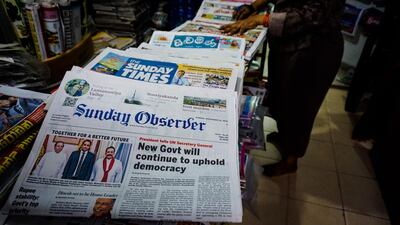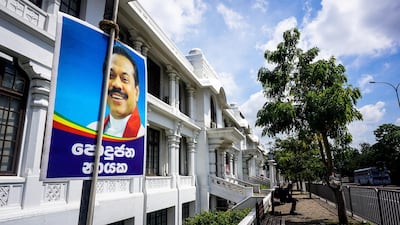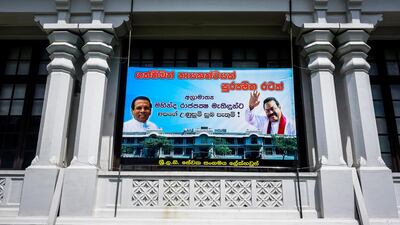Editorial independence was lost in just a half hour at The Sunday Observer, the weekly English-language newspaper where until a week ago well-known Sri Lankan journalist Dharisha Bastians served as editor.
On October 26, at 7.30pm local time, Mahinda Rajapaksa was sworn in as Sri Lanka’s new prime minister in an unconstitutional swoop on the premiership endorsed by President Maithripala Sirisena. Thirty minutes later, his supporters stormed state media publications that since Mr Rajapaksa’s presidential election defeat in 2015 had experienced greater press freedom than ever.
Led by a former information minister, trade unionists from Mr Rajapaksa's Sri Lanka Podujana Peramuna party entered newsrooms across Colombo's Lake House, Sri Lanka's version of Britain's Broadcasting House, taking control of five newspapers. They are now run by Rajapaksa loyalists. Posters of Mr Rajapaksa next to Mr Sirisena are splashed on the front of the building.
For government-controlled organisations to switch allegiances with a new government is normal in Sri Lanka, but those who were present say this was different to previous transitions; a forceful takeover before parliament has confirmed Mr Rajapaksa as prime minister.
"They started marching along the corridors, these big men in shorts," said Bastians, who also works as a correspondent for The New York Times. "They started going into editorial [newsrooms], changing pages, cartoons, editorials, everything," she said. "We thought it would be more streamlined. But this was a hostile takeover."
Pro-Rajapaksa enforcers also took over two public TV channels, Rupavahini and ITN, threatening to attack its deputy editor Subhash Jayawardena if he did not leave.
The Rajapaksa heavies also forced scared staff at three newspapers to lavish front-page praise on the new prime minister for muscling his way back to power.
A day later, they asked that Bastians surrender editorial control of the Observer for its Sunday edition. A minister in Mr Rajapaksa's team called the paper, telling a staffer: "I hope you know who took over as prime minister yesterday." Bastians quit the same day.
"I was not willing to be coerced into toeing an editorial line, and I am therefore unable to take responsibility for tomorrow's edition," she wrote on Twitter.
The bid by Rajapaksa allies to normalise his takeover is working, journalists said. Television stations and newspapers do not carry news of the constitutional crisis, nor that sidelined Prime Minister Ranil Wickremesinghe is holding out at his Temple Trees residence.
Observers say the assault on the Sri Lankan press shows that Mr Rajapaksa’s return to rule is likely to be autocratic.
"The cavalier attitude and complete disregard for democratic processes demonstrated by those in the Rajapaksa-led government has emboldened supporters to act in this manner," said Roel Raymond, a journalist in Colombo for South Asian news site Roar Media.
“The aggression shown by trade unions supporting Rajapaksa this time, after he was unconstitutionally appointed as prime minister, indicates an undesirable return to that culture of toxic impunity.”
_______________
Read more:
Colombo on edge as Sri Lanka faces constitutional crisis
Inside Temple Trees: Prime minister’s bungalow becomes Sri Lanka’s seed of resistance
_______________
Press freedom was not a given before Mr Rajapaksa came to power as president in 2005. In 1989, the chairman of the country's Independent Television Network, Thevis Guruge, was killed by members of the Janatha Vimukthi Peramuna communist party for refusing to align with them. But press freedom organisations say intimidation, harassment and assault on journalists increased markedly during his presidential tenure.
Lasantha Wickrematunge, former editor of weekly newspaper The Sunday Leader and critic of the Rajapaksa family, was shot dead in Colombo in 2009. Due to give evidence about alleged corruption of Mr Rajapaksa's brother, Gotabhaya, then defence minister, four men on motorcycles surrounded his car and opened fire. His death was described as the "biggest blow" yet to Sri Lankan press freedom.
Rights groups blamed Mr Rajapaksa's government for Wickrematunge's death, accusing it of inciting hatred against him and failing to stop attacks on journalists. That is why his return is so galling for press advocates here. His return haunts them, reviving memories of the darkest hours of his presidency.
"The current situation in Sri Lanka is very worrying. This is both unacceptable for working journalists and dangerous for the whole society," said Daniel Bastard, head of Reporters Without Borders' Asia-Pacific desk, who calls Mr Rajapaksa one of the biggest "press freedom predators" in the world.
"We call on all political leaders in Sri Lanka to act with responsibility in letting reporters do their work and report freely from all sides," he said. "This is the best way to ensure democracy is respected and to prevent this political crisis from becoming a bloodbath."
More worrying for those here, is that the wider situation in the country is likely to deteriorate. Residents of Colombo and rights groups express anxiety that Mr Rajapaksa will reinvigorate ethnic and religious tensions, crush dissent and do whatever it takes to consolidate power, like the takeover of Lake House.
Bastians said journalists know of life under Mr Rajapaksa. Journalists should never be the story, they often say, but the Sri Lankan strongman has sought to make them exactly that to protect himself from accusations of corruption, mismanagement and serving as a bedfellow for Beijing.
After Bastians helped to report a bombshell New York Times report in June that revealed how Mr Rajapaksa effectively handed China a deep sea port in his hometown of Hambantota in return for billion dollar loans, handcuffed with high interest rates, he held a press conference, naming her. His team held up a photo of Bastians, singling her out.
She received "crazy intimidation" on social media, she says. The Times stood by her, but the intimidation lingers and could get worse now he is back in power, at least until parliament votes on the premiership.
"This happened in opposition," she says. "That is important to know."
_______________
Read more:
Sri Lanka crisis: everything you need to know
Sri Lanka political crisis splits allies
Sri Lanka speaker defies president and summons parliament
_______________
Dust and sand storms compared
Sand storm
- Particle size: Larger, heavier sand grains
- Visibility: Often dramatic with thick "walls" of sand
- Duration: Short-lived, typically localised
- Travel distance: Limited
- Source: Open desert areas with strong winds
Dust storm
- Particle size: Much finer, lightweight particles
- Visibility: Hazy skies but less intense
- Duration: Can linger for days
- Travel distance: Long-range, up to thousands of kilometres
- Source: Can be carried from distant regions
UAE currency: the story behind the money in your pockets
'Cheb%20Khaled'
%3Cp%3E%3Cstrong%3EArtist%3A%20%3C%2Fstrong%3EKhaled%3Cbr%3E%3Cstrong%3ELabel%3A%20%3C%2Fstrong%3EBelieve%3Cbr%3E%3Cstrong%3ERating%3A%3C%2Fstrong%3E%204%2F5%3C%2Fp%3E%0A
Dhadak 2
Director: Shazia Iqbal
Starring: Siddhant Chaturvedi, Triptii Dimri
Rating: 1/5
500 People from Gaza enter France
115 Special programme for artists
25 Evacuation of injured and sick
City's slump
L - Juventus, 2-0
D - C Palace, 2-2
W - N Forest, 3-0
L - Liverpool, 2-0
D - Feyenoord, 3-3
L - Tottenham, 4-0
L - Brighton, 2-1
L - Sporting, 4-1
L - Bournemouth, 2-1
L - Tottenham, 2-1
The Vines - In Miracle Land
Two stars
Killing of Qassem Suleimani
Mohammed bin Zayed Majlis
What the law says
Micro-retirement is not a recognised concept or employment status under Federal Decree Law No. 33 of 2021 on the Regulation of Labour Relations (as amended) (UAE Labour Law). As such, it reflects a voluntary work-life balance practice, rather than a recognised legal employment category, according to Dilini Loku, senior associate for law firm Gateley Middle East.
“Some companies may offer formal sabbatical policies or career break programmes; however, beyond such arrangements, there is no automatic right or statutory entitlement to extended breaks,” she explains.
“Any leave taken beyond statutory entitlements, such as annual leave, is typically regarded as unpaid leave in accordance with Article 33 of the UAE Labour Law. While employees may legally take unpaid leave, such requests are subject to the employer’s discretion and require approval.”
If an employee resigns to pursue micro-retirement, the employment contract is terminated, and the employer is under no legal obligation to rehire the employee in the future unless specific contractual agreements are in place (such as return-to-work arrangements), which are generally uncommon, Ms Loku adds.
KILLING OF QASSEM SULEIMANI
Who has been sanctioned?
Daniella Weiss and Nachala
Described as 'the grandmother of the settler movement', she has encouraged the expansion of settlements for decades. The 79 year old leads radical settler movement Nachala, whose aim is for Israel to annex Gaza and the occupied West Bank, where it helps settlers built outposts.
Harel Libi & Libi Construction and Infrastructure
Libi has been involved in threatening and perpetuating acts of aggression and violence against Palestinians. His firm has provided logistical and financial support for the establishment of illegal outposts.
Zohar Sabah
Runs a settler outpost named Zohar’s Farm and has previously faced charges of violence against Palestinians. He was indicted by Israel’s State Attorney’s Office in September for allegedly participating in a violent attack against Palestinians and activists in the West Bank village of Muarrajat.
Coco’s Farm and Neria’s Farm
These are illegal outposts in the West Bank, which are at the vanguard of the settler movement. According to the UK, they are associated with people who have been involved in enabling, inciting, promoting or providing support for activities that amount to “serious abuse”.
Match info:
Wolves 1
Boly (57')
Manchester City 1
Laporte (69')
The specs
- Engine: 3.9-litre twin-turbo V8
- Power: 640hp
- Torque: 760nm
- On sale: 2026
- Price: Not announced yet
Coming soon
Torno Subito by Massimo Bottura
When the W Dubai – The Palm hotel opens at the end of this year, one of the highlights will be Massimo Bottura’s new restaurant, Torno Subito, which promises “to take guests on a journey back to 1960s Italy”. It is the three Michelinstarred chef’s first venture in Dubai and should be every bit as ambitious as you would expect from the man whose restaurant in Italy, Osteria Francescana, was crowned number one in this year’s list of the World’s 50 Best Restaurants.
Akira Back Dubai
Another exciting opening at the W Dubai – The Palm hotel is South Korean chef Akira Back’s new restaurant, which will continue to showcase some of the finest Asian food in the world. Back, whose Seoul restaurant, Dosa, won a Michelin star last year, describes his menu as, “an innovative Japanese cuisine prepared with a Korean accent”.
Dinner by Heston Blumenthal
The highly experimental chef, whose dishes are as much about spectacle as taste, opens his first restaurant in Dubai next year. Housed at The Royal Atlantis Resort & Residences, Dinner by Heston Blumenthal will feature contemporary twists on recipes that date back to the 1300s, including goats’ milk cheesecake. Always remember with a Blumenthal dish: nothing is quite as it seems.
Company%20profile%20
%3Cp%3E%3Cstrong%3EName%3A%20%3C%2Fstrong%3EElggo%3Cbr%3E%3Cstrong%3EStarted%3A%3C%2Fstrong%3E%20August%202022%3Cbr%3E%3Cstrong%3EFounders%3A%3C%2Fstrong%3E%20Luma%20Makari%20and%20Mirna%20Mneimneh%3Cbr%3E%3Cstrong%3EBased%3A%3C%2Fstrong%3E%20Dubai%2C%20UAE%3Cbr%3E%3Cstrong%3ESector%3A%3C%2Fstrong%3E%20Education%20technology%20%2F%20health%20technology%3Cbr%3E%3Cstrong%3ESize%3A%3C%2Fstrong%3E%20Four%20employees%3Cbr%3E%3Cstrong%3EInvestment%20stage%3A%3C%2Fstrong%3E%20Pre-seed%3C%2Fp%3E%0A
TERMINAL HIGH ALTITUDE AREA DEFENCE (THAAD)
What is THAAD?
It is considered to be the US's most superior missile defence system.
Production:
It was created in 2008.
Speed:
THAAD missiles can travel at over Mach 8, so fast that it is hypersonic.
Abilities:
THAAD is designed to take out ballistic missiles as they are on their downward trajectory towards their target, otherwise known as the "terminal phase".
Purpose:
To protect high-value strategic sites, such as airfields or population centres.
Range:
THAAD can target projectiles inside and outside the Earth's atmosphere, at an altitude of 150 kilometres above the Earth's surface.
Creators:
Lockheed Martin was originally granted the contract to develop the system in 1992. Defence company Raytheon sub-contracts to develop other major parts of the system, such as ground-based radar.
UAE and THAAD:
In 2011, the UAE became the first country outside of the US to buy two THAAD missile defence systems. It then stationed them in 2016, becoming the first Gulf country to do so.



